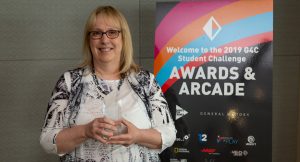 Each year, G4C works with cohorts of teachers in ‘spotlight cities’ across the country – and provides educators with the training, curriculum and tools to bring game based learning into their classrooms. Over the last five years, we have had the pleasure of working with an incredibly talented pool of teachers and we have come to learn that teachers are the real heroes of our community. Over the next few months we will be celebrating their work (and sharing their secrets to success) through a ‘teacher spotlight’ blog series.
Each year, G4C works with cohorts of teachers in ‘spotlight cities’ across the country – and provides educators with the training, curriculum and tools to bring game based learning into their classrooms. Over the last five years, we have had the pleasure of working with an incredibly talented pool of teachers and we have come to learn that teachers are the real heroes of our community. Over the next few months we will be celebrating their work (and sharing their secrets to success) through a ‘teacher spotlight’ blog series.
Up first is Melinda Bush from the Livonia Career Technical Center in Detroit.
TEACHER COHORT: Detroit
SCHOOL: Livonia Career Technical Center
SUBJECT AREA: Mobile Apps/Game/Animation/Web
GRADE LEVEL TAUGHT: High School
YEARS PARTICIPATED IN THE PROGRAM: 3
Q: What type of environment do you strive to create in your classroom?
A: A collaborative one. I spend a lot of time at the beginning of the year doing team-building activities. There’s a healthy emphasis on them relying on each other instead of relying on me, building problem-solving skills, and figuring out what is not working…They collaborate. And because my students come from all different schools it takes some time to build up to that because they don’t necessarily know each other.
Q: What made you decide to participate in the G4C Student Challenge?
A: I spent a lot of time researching game competitions and it popped up. It’s a wonderful opportunity for students to be rewarded for all of their hard work and for them to be recognized. It helps a lot in terms of me motivating them to do their work in the classroom.
Q: What was your experience with video games before the Student Challenge?
A: I have been teaching it for a while and investing a lot of time and energy into it. Having said that, I feel like a beginner every single day of the week…Everything changes so much so I feel like a newbie every time I turn around. I used to use GameMaker, then I switched to Construct. Everything I was doing with Unity was brand new. Stuff is changing constantly and it always feels like a new thing.
So yes I had experience before, but I’m constantly looking to make things better or different or just keeping up with things, so I still feel I have a lot of room to grow.
Q: What is your process for teaching the program in your classroom?
A: I do teach them how to use a [game design] tool, but then I also use this Ted Talk by Jane McGonigal about gaming to make a better world. Then we spend time picking a theme and researching it. Then they create a paper prototype and through that they learn the engineering design process. They’re taught what iteration and playtesting are. It really helps me with my curriculum to reinforce all of that.
Q: How has this program changed the way you teach?
A: It helps give me a structure and meaning to what we’re doing. All teachers have content standards they have to cover, and the meat of mine is to create a digital product for a client according to their needs. What I find the most difficult thing to do with kids is they want to do what they want to do. They have difficulty with the concept…The program gives the context for me to teach that. It helps give real-world reinforcement of concepts that need to be taught them, that are important once they leave high school.
Q: Can you tell us about your students’ successes?
A: I tell my kids how cool it is to be recognized at the Awards Ceremony, and what a nice job it does at making kids feel special. Over the past couple of years, we’ve had quite a few students go. As a teacher you don’t generally see any rewards. But when you’re there and the kids are smiling, the parents are smiling, and you bring them up to the mic and ask them questions… It’s so good for their development and recognizing their accomplishments makes them feel special.
It’s been really fun over the past couple of years to see so many kids who have had the opportunity to experience that, as well as winning the Grand Prize. It helps motivate the students behind them who are new and help give them a goal to work for.

